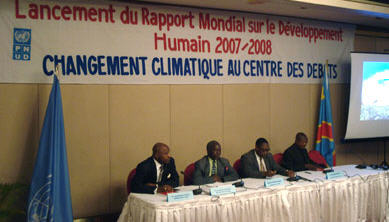A climate change conference was held in Kinshasa’s Grand Hotel on 21 December 2007. Organised by the UNDP who launched the "World Report on Human Development 2007/2008", the conference defined the nature of climate change in the DRC, and presented the challenges for the future. 
In front of ambassadors, senators and civil society representatives, UNDP DRC Director Dr. Adama Guindo explained that the DRC was an environmental treasure, whose forests contain huge biodiversity and 30% of Africa’s freshwater resources.
“There is a consensus that developing countries are more vulnerable to climate change. The issue is how to define the politics that will permit a consideration of the problem, and to find the best solution for the present and the future,” he said.
Climate change in the DRC negatively affects agricultural production and rainfall levels, while causing more extreme storms, the extinction of ecosystems, and increasing the risk of diseases.
Dr. Guindo went on to say that even though those most responsible for climate change are the richer industrialised countries, between 2000 and 2004 one in 19 people in the developing world were affected by natural disasters induced by climate change, compared to one in 500 in the developed world.
“This conference will look for a road that will focus on adaption to climate change, actions to reduce carbon dioxide emissions from deforestation, but also the technological transfers and financial mechanisms required for reducing the impacts of climate change,” he said.
“What is climate change in the DRC? How does it manifest itself, and how can we, civil society, politicians and the international community, come together to plan and find a solution?” Dr. Guindo concluded.
DRC Senate president Mr. Leon Kengo said that the senate was determined to examine the problem of climate change in 2008.
“We will conduct a workshop on 2 January 2008, regarding the forestry code and it application. It will examine what role senators can play in responding to the problems in this vital sector,” he explained.
He went on to say that they will listen to the expectations of local communities, the private sector and the international community in facing the challenge of forestry and climate change.
In explained the challenges ahead Mr. Kengo said: “How can we aid our government in overcoming the history of poor management of these forests? What is lacking for the best application of the forestry code? I hope that in future debates on climate change the proper response will be found.”
Related articles
- • Claims that threat to Congo Basin forest is waning are misleading (July 22, 2013)
- • Deforestation Slows in Congo Basin (July 22, 2013)
- • Thousands of Women March Against M23 Rebels in Kinshasa (November 24, 2012)
- • Widespread abuse of logging permits opens up Congo's forests to more destruction (October 25, 2012)
- • DR Congo, IMF to Co-Host Conference on the Management of Natural Resources (March 13, 2012)
- • African Rainforests Continue to Face Challenges (January 6, 2012)
- • Tshisekedi Says He Won, Can He Prove It? (December 17, 2011)
- • 32 Million Congolese Voters Set to Elect Their Leaders (November 27, 2011)
- • UN advises prudent use of abundant resources to spur development (October 10, 2011)
- • Kabila Makes Re-Election Pitch in Speech to the Nation (September 15, 2011)
- • Security Council extends mandate of UN mission in DR Congo (June 28, 2011)
- • Rights Groups: Strengthen Civilian Protection Before Elections (June 9, 2011)
- • Upcoming UN-backed summit to focus on sustainable management of rainforests (April 13, 2011)
- • DR Congo blocks oil search in Virunga National Park (March 18, 2011)
- • UN Sanctions FDLR Leaders, CNDP Rebel Commander Integrated into Army (December 2, 2010)
- • UN launches patrols to head off rebel violence during holiday season (December 1, 2010)
- • 2010 Human Development Report analyses long-term development trends (November 4, 2010)
- • Congo Defense Minister Rejects UN Allegations against Army (October 17, 2010)
- • Rebel leader presumed responsible for mass rape arrested (October 5, 2010)
- • UN DR Congo Report Exposes Grave Crimes (October 1, 2010)
- • UN says peacekeepers 'failed' DR Congo rape victims (September 7, 2010)
- • UN Defends Inaction on Mass Rapes in Eastern Congo, Government Missing in Action (August 26, 2010)
- • Two Suspects Arrested in Attack on MONUSCO Base (August 20, 2010)
- • Ban Ki-moon deplores deadly attack against blue helmets in North Kivu (August 18, 2010)
- • Congo Catholic Bishops Praise U.S. Law on 'Conflict Minerals' (August 3, 2010)
- • Ban Ki-moon inaugurates new phase of UN mission in DR Congo (July 1, 2010)
- • Congo Celebrates 50th Anniversary of Independence (June 30, 2010)
- • Top UN envoy bids farewell to first batch of blue helmets leaving DR Congo (June 16, 2010)
- • Veteran United States diplomat appointed to top UN post in DR Congo (June 9, 2010)
- • Top UN officials urge inquiry into killing of Congolese human rights activist (June 3, 2010)
Tags: |







